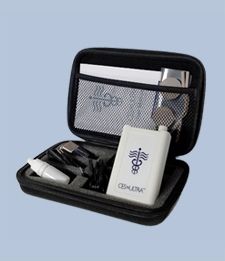Why Psychiatry needs CES
by Jason Worchel, M.D.
Jason Worchel, M.D. is a noted psychiatrist and Director of the Hilo Mental Health Center in Hilo, HI. The following posts are taken from a paper written by Dr. Worchel in his testimony before the F.D.A. concerning the effectiveness and safety of CES from the perspective of a practicing psychiatrist.
The Challenge of Psycho-Pharmacology
As a practicing psychiatrist, I am constantly struggling with balancing purported efficacy with known risks of somatic interventions. While currently approved interventions have demonstrated efficacy relative to placebo, the rate of improvement with placebo remains consistently above 30%.
With the increasing prevalence of polypharmacy, there is an increasing risk of adverse side effects for the statistical hope for improved outcomes as demonstrated in clinical trials conducted with select populations in controlled environments. In addition to evaluating the risk/benefits of various treatments, I know from multiple studies most patients are not adherent to the prescribed medication regimens and discontinue medications altogether within a relatively short period of time.
Though my goal is to treat the presenting illness or alleviate its symptoms, my primary duty to my patients is to “do no harm.” This typically results in an approach that follows a spectrum of interventions with initial treatments being those with the least risk of adverse side effects.
There is no risk conventional interventions that currently constitute the standard of care will be bypassed by using CES.
Experience
I have worked with primary care physicians in our federally qualified health clinics on the Big Island. They, like others across the country, are stymied and frustrated by the challenge of treating chronic pain.
In particular, they face patients with bona fide pain but who also have depression, anxiety, insomnia and substance abuse. With regards to treatment interventions, they are damned if the do and damned if the don’t treatment with various classes of analgesic medications, including narcotic medications.
They are particularly afraid of the increasing fatalities occurring with the use of narcotic analgesic medications in combination with benzodiazepines and antidepressant medications. They welcome alternatives to medications for those patients whose emotional distress intensifies their suffering and pain sensation. CES could provide a safe alternative for them that do not currently exist.
In summary, CES represents as safe intervention for conditions for which existing treatments, especially pharmacologic and invasive interventions pose significant risk for adverse side effects. It is especially beneficial in defined populations. These include those who refuse medications and psychotherapy, dual diagnosed patients, geriatric patients, females of child bearing age and during pregnancy.
Advantages of CES
I would like to highlight various advantages of CES relative to other existing treatments, especially medications that may not be well appreciated. Take for example, the difficulty faced by primary care physicians and mental health professionals in treating female patients of child bearing age. All available medications have teratogenic risk and are not recommended during pregnancy and breast feeding. Patients desiring to become pregnant have justified concerns about taking psychotropic medication.
Current treatment algorithms encourage polypharmacy when initial treatments with a single drug are not effective. While there is some increased response, polypharmacy only increases the side effects burden and can result in untoward drug/drug interactions. These types of problems do not occur with CES.
Many psychotropic medications for the treatments of depression, anxiety and insomnia have discontinuation syndromes. Given the high rate of discontinuation of these medications by patients due to side effects and lack of efficacy, many patients unfortunately suffer when the take a medication prescribed to alleviate their suffering. This does not occur with CES. There are circumstances, for example prior to surgery, when certain psychotropic medications are required to be discontinued. CES does not have to be discontinued prior to surgery.
One my greatest concerns in treating patients with depression, anxiety and insomnia involves suicide. We know increased risk of suicide in depressed patients but it is often global insomnia is a significant risk factor for suicide as well as anxiety/agitation. Although safer than the older tricyclic and tetracylcic antidepressants, the current medications carry a significant risk of death in overdose, especially when combined with other analgesic medications. Too often, the medications we prescribed to prevent suicide become a means through which the patient attempts suicide. In fact, there are black box warnings that these medications may increase suicidal impulses, especially in adolescents. CES does not pose this risk.
As in many developed countries, we are an aging population. The treatment of depression, anxiety and insomnia in the geriatric patients with medications present unique challenges due to the increased risk of adverse side effects. These side effects include the risk of falls and motor vehicle accidents. Again, the number of medications taken in our geriatric patients continues to increase. Thus risk of adding psychotropic medications to their other medications poses additional drug/drug interactions and side effect burden.
CES avoids this disadvantage and provides a safe alternative to patients, their families and care givers. Furthermore, missing a CES treatment does not carry the risks of missing doses of psychotropic medications in this population.More CES Research – https://www.cesultra.com/research-resources/


